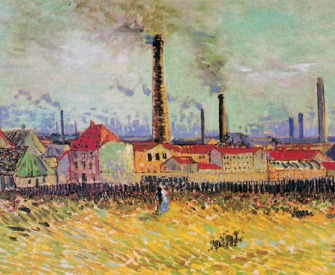London is unique, because it is a city in which one can roam for hours without leaving the built-up area and without seeing the slightest sign of the approach of open country. This enormous agglomeration of population on a single spot has multiplied a hundredfold the economic strength of the 2.5 million inhabitants concentrated there. This great population has made London the commercial capital of the world and has created the gigantic docks in which are assembled the thousands of ships which always cover the River Thames. I know nothing more imposing than the view one obtains of the river when sailing from the sea up to London Bridge. Especially above Woolwich, the houses and docks are packed tightly together on both banks of the river. The farther one goes up the river the thicker becomes the concentration of ships lying at anchor, so that eventually only a narrow shipping lane is left free in midstream. Here hundreds of steamships dart rapidly to and fro. All this is so magnificent and impressive that one is lost in admiration. The traveler has good reason to marvel at England’s greatness even before he steps on English soil.
It is only later that the traveler appreciates the human suffering which has made all this possible. He can only realize the price that has been paid for all this magnificence after he has tramped the pavements of the main streets of London for some days and has tired himself out by jostling his way through the crowds and by dodging the endless stream of coaches and carts which fills the streets. It is only when he has visited the slums of this great city that it dawns upon him that the inhabitants of modern London have had to sacrifice so much that is best in human nature in order to create those wonders of civilization with which their city teems. The vast majority of Londoners have had to let so many of their potential creative faculties lie dormant, stunted, and unused in order that a small, closely-knit group of their fellow citizens could develop to the full the qualities with which nature has endowed them. The restless and noisy activity of the crowded streets is highly distasteful, and it is surely abhorrent to human nature itself. Hundreds of thousands of men and women drawn from all classes and ranks of society pack the streets of London. Are they not all human beings with the same innate characteristics and potentialities? Are they not all equally interested in the pursuit of happiness? And do they not all aim at happiness by following similar methods? Yet they rush past each other as if they had nothing in common. They are tacitly agreed on one thing only—that everyone should keep to the right of the pavement so as not to collide with the stream of people moving in the opposite direction. No one even thinks of sparing a glance for his neighbor in the streets. The more that Londoners are packed into a tiny space, the more repulsive and disgraceful becomes the brutal indifference with which they ignore their neighbors and selfishly concentrate upon their private affairs. We know well enough that this isolation of the individual—this narrowminded egotism—is everywhere the fundamental principle of modern society. But nowhere is this selfish egotism so blatantly evident as in the frantic bustle of the great city. The disintegration of society into individuals, each guided by his private principles and each pursuing his own aims has been pushed to its furthest limits in London.
What is true of London is true also of all the great towns, such as Manchester, Birmingham, and Leeds. Everywhere one finds on the one hand the most barbarous indifference and selfish egotism and on the other the most distressing scenes of misery and poverty. Signs of social conflict are to be found everywhere. Everyone turns his house into a fortress to defend himself—under the protection of the law—from the depredations of his neighbors. Class warfare is so open and shameless that it has to be seen to be believed. The observer of such an appalling state of affairs must shudder at the consequences of such feverish activity and can only marvel that so crazy a social and economic structure should survive at all.

, c. 1850. © The Bridgeman Art Library International.
Every great town has one or more slum areas into which the working classes are packed. Sometimes, of course, poverty is to be found hidden away in alleys close to the stately homes of the wealthy. Generally, however, the workers are segregated in separate districts where they struggle through life as best they can out of sight of the more fortunate classes of society. The slums of the English towns have much in common—the worst houses in a town being found in the worst districts. They are generally unplanned wildernesses of one- or two-storied terrace houses built of brick. Wherever possible these have cellars which are also used as dwellings. These little houses of three or four rooms and a kitchen are called cottages, and are, throughout England, except for some parts of London, where the working classes normally live. The streets themselves are usually unpaved and full of holes. They are filthy and strewn with animal and vegetable refuse. Since they have neither gutters nor drains, the refuse accumulates in stagnant, stinking puddles. Ventilation in the slums is inadequate, owing to the hopelessly unplanned nature of these areas. A great many people live huddled together in a very small area, and so it is easy to imagine the nature of the air in these workers’ quarters. However, in fine weather the streets are used for the drying of washing, and clotheslines are stretched across the streets from house to house, and wet garments are hung out on them.
St. Giles is situated in the most densely populated part of London and is surrounded by splendid, wide streets which are used by the fashionable world. It is close to Oxford Street, Trafalgar Square, and the Strand. It is a confused conglomeration of tall houses of three or four stories. The narrow, dirty streets are just as crowded as the main thoroughfares, but in St. Giles one sees only members of the working classes. The narrowness of the roads is accentuated by the presence of street markets in which baskets of rotting and virtually inedible vegetables and fruit are exposed for sale. The smells from these and from the butchers’ stalls is appalling. The houses are packed from cellar to attic, and they are as dirty inside as outside. No human being would willingly inhabit such dens. Yet even worse conditions are to be found in the houses which lie off the main road down narrow alleys leading to the courts. These dwellings are approached by covered passages between the houses. The extent to which these filthy passages are falling into decay beggars all description. There is hardly an unbroken windowpane to be seen, the walls are crumbling, the doorposts and window frames are loose and rotten. The doors, where they exist, are made of old boards nailed together. Indeed, in this nest of thieves, doors are superfluous because there is nothing worth stealing. Piles of refuse and ashes lie all over the place, and the slops thrown out into the street collect in pools which emit a foul stench. Here live the poorest of the poor. Here the worst-paid workers rub shoulders with thieves, rogues, and prostitutes. Most of them have come from Ireland or are of Irish extraction. Those who have not yet been entirely engulfed in the morass of iniquity by which they are surrounded are daily losing the power to resist the demoralizing influences of poverty, dirt, and low environment.
St. Giles, however, is by no means the only London slum. In the vast mass of streets which make up the metropolis, there are thousands of hidden alleys and passages where the houses are so bad that no one with an iota of self-respect would live in them unless forced to do so by dire poverty.
From The Condition of the Working Class in England. Assenting to his father, Engels worked in an export firm in Bremen from 1838–1841 while also publishing atheist articles under a pseudonym. He converted to communism in 1842 and moved to Manchester, where he met the Irish worker Mary Burns, with whom he lived until her death in 1863. Engels coauthored The Communist Manifesto with Karl Marx in 1848.
Back to Issue





